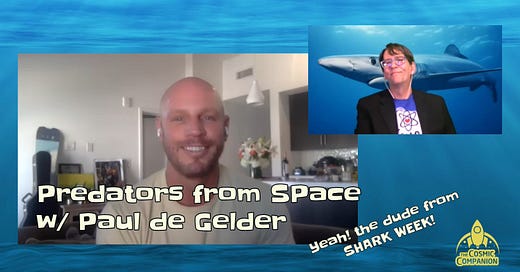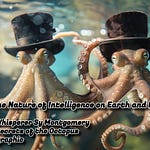Hello everyone!
This week on The Cosmic Companion, we imagine PREDATORS FROM SPACE!!! as we welcome Shark Week regular Paul de Gelder to the show. We will be talking about his new book, Shark: Why We Need to Save the World’s Most Misunderstood Predator. And — did I mention? PREDATORS FROM SPACE!!!
Life on other worlds is likely to be far different than life on Earth. However, most lifeforms throughout the Cosmos are likely to share a few common traits. The laws of chemistry and physics suggest that carbon is an ideal chemical backbone for the formation of life, and water is a perfect medium if you want to create a bunch of complex chemicals and spread them around a planet.
Also many lifeforms on Earth depend on other life for their sustenance and survival. Even herbivores and vegans consume other forms of life. We can’t all be plants, living off photosynthesis, all snooty and stuff, you know…
This means that life on other worlds is likely to include… PREDATORS FROM SPACE!!
Every living being requires a food source — whether that be sunlight or jackfruit tacos! [Mmmm… Tacos…] If you thought the Earth was a dangerous place, just imagine what kind of predators might be lurking out there in the rest of the universe!
The earliest known animal predator was an ancestor of modern jellyfish which plied Earth’s oceans roughly 600 million years ago. Similar hunters may be found on other worlds where oceans are found.
It’s a big Universe around us, and astronomers currently know of over 5,200 planets orbiting other stars. Like the worlds of our own solar system, a fraction of planets elsewhere can be rocky, with varying amounts of water on their surface or in their atmosphere.
These fluids are ideal for flying, floating, or swimming. Let’s start with water worlds.
Although some lifeforms (I’m looking in your direction, sponges) are immobile, living out their lives on the same boring rock on which they were born, this may not be the best strategy for life as a PREDATOR FROM SPACE!!!
If you’re going to move around an ocean of liquid water, you either need to float or propel yourself.
Let’s face facts. Floating is probably not the most efficient way to hunt anything. Tracking prey requires both a means of propulsion, as well as control.
[The dude’s right. I’m not lion.]
(Thank you!)
One of the most successful of all marine predators on Earth are sharks, and they’ve been around for 420 million years. These creatures — streamlined to get through water, fins for propulsion and steering and teeth designed for hunting — may be a model for marine predators on other worlds.
That’s right… SPACE SHARKS!!!
This idea, of course, brings us to our special guest, Paul de Gelder, talking about his experience being attacked by one of these creatures… (an Earth-bound shark. NOT a space shark) and devoting his career to preserving “the world’s most misunderstood predator.”
Insects have been around for nearly as long as sharks. Some worlds may be home to giant, venomous insects lurking in the shadows, waiting to pounce on unsuspecting prey.
And don’t even get me started on the space dragons. These guys could be like the T-Rex of the galaxy, with poisonous breath and a wingspan that can block out the sky... OK. Probably not.
But it’s not just the big, flashy creatures you have to worry about. There are (even more likely) plenty of microscopic predators out there as well. We’re talking about space viruses and bacteria-like things that might — possibly — turn your insides into goo in no time flat.
So if you’re planning on doing any space travel, make sure you pack plenty of bug spray and a good space suit. Trust me, you don’t want to end up as dinner for one of these extraterrestrial beasties.
If you enjoyed this episode of The Cosmic Companion, please subscribe, download, share, and do all that neato social media stuff. It sure would be appreciated.
Head on over to thecosmiccompanion.net to check out all our episodes and sign up for our newsletter. You can even wander around our new interactive 3D Moon base and more. So, tots worth it.
Next week on The Cosmic Companion, we discuss Teaching Kids About Science! We’ll be joined by Dean Regas, astronomer at Cincinnati Observatory, author of the new book 1,000 Facts About Space from National Geographic Kids! Make sure to join us starting on 21 January.
Clear skies!
James













Share this post